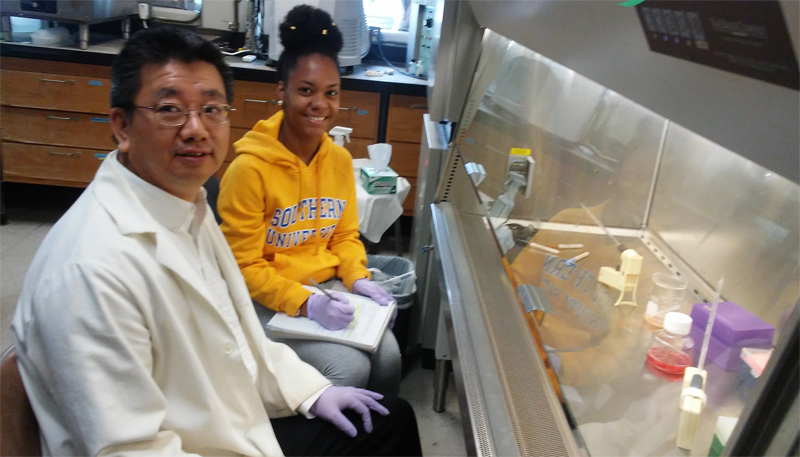Xiaoping Yi
Department Biological science and Chemistry, College of Sciences and Engineering, Southern University and A&M College at Baton Rouge
Project Title
Molecular mechanism of prostate cancer progression
Mentors
Konstantin G. Kousoulas, Ph.D., Louisiana State University, Department of Pathobiological Science
Eduardo Martines-Ceballos, Ph.D., Southern University and A&M College, Department of Pathobiological Science
Funding Period
Project (May 1, 2021 - February 28, 2024)
Abstract
Prostate cancer is the most common cancer in men with more than 1.2 million cases and 380,000 deaths world wide and 358,000 deaths annually and with more than 160,000 new cases per year in the United States (Siegel et al., 2019). Age, ethnicity, diet, gene mutations and a number of other factors are associated with increased risk for prostate cancer. However, the cellular processes that are responsible for generation of a cancer cell are not well known, although it is suspected that dysregulation of cellular apoptotic pathways may be directly or indirectly contributing to prostate cell generation. Our overall hypothesis is that widely distributed toxins such as Diepoxybutane (DEB), a carcinogenic metabolite of 1, 3-butadiene (BD), a hazardous chemical used in rubber production and present in automobile exhaust and tobacco smoke cause specific signaling cellular changes leading to prostate cancer. Our long-term goal is to investigate the molecular mechanism(s) of the DEB toxin-induced carcinogenesis utilizing 3D cell cultures aiming to identify the main cell signaling pathways activated and/or inhibited by DEB. Based on previous results, we propose to identify the molecular mechanism by which DEB activates specific cell signaling pathways contributing to tumor progression using our 3D cellular model of Diepoxybutane (DEB) treatment. Specifically, we hypothesize that DEB may be effective in inducing Epithelial-to- Mesenchymal Transition (EMT), and that it stimulates drug resistant mechanisms through the activation of specific cell signaling pathways. We will test our hypothesis by the following Aims. (1). To identify the functional role of the PI3K/AKT/ mTOR cell signaling pathway in prostate cancer progression. To accomplish this Aim, prostate cancer spheroids (3D cancer cultures) will be treated with DEB in the absence or presence of specific signal transduction inhibitors and the effect of DEB on cells under specific pathway inhibition conditions will be examined at the transcriptomic and proteomic levels. (2). To investigate the molecular mechanism by which DEB promotes prostate cancer progression. To compliment the above achievement, single cell RNA sequencing and proteomic analyses will be performed. The results obtained from this project will help us understand the role of DEB on prostate cancer progression and will provide an insight on mechanisms of chemotherapy resistance. Furthermore, the results obtained from this project will provide insights into new important approaches to combat prostate cancer, which may also be applicable to other types of cancer. More importantly, the knowledge acquired at the conclusion of this project may enhance our ability to combat cancer.

